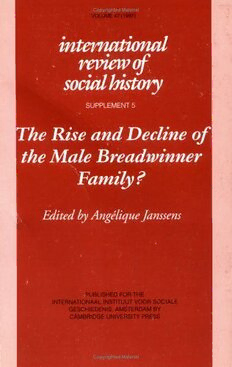
The Rise and Decline of the Male Breadwinner Family?: Studies in Gendered Patterns of Labour Division and Household Organisation (International Review of Social History Supplements (No. 5)) PDF
204 Pages·1998·3.986 MB·English
Most books are stored in the elastic cloud where traffic is expensive. For this reason, we have a limit on daily download.
Preview The Rise and Decline of the Male Breadwinner Family?: Studies in Gendered Patterns of Labour Division and Household Organisation (International Review of Social History Supplements (No. 5))
Description:
This collection of essays looks at the origins and expansion of different patterns of breadwinning in both western and non-western history. As a collection it provides new insights into the historical and cross-cultural development of the male breadwinner family and its determinants, and, as such, it provides an important contribution to the ongoing debate on patterns of breadwinning. An important range of factors previously undervalued in the debate are considered: the effects of local labour markets in interaction with family strategies and family values; employers' strategies and the effects of capital accumulation and the rise of international commercial networks; the effects of egalitarian communist ideologies; and the differential ways in which modern welfare states were constructed. The volume calls for a renewed research effort in order to reconstruct the male breadwinner family as the norm and to work towards the integration of different explanatory models.
See more
The list of books you might like
Most books are stored in the elastic cloud where traffic is expensive. For this reason, we have a limit on daily download.
